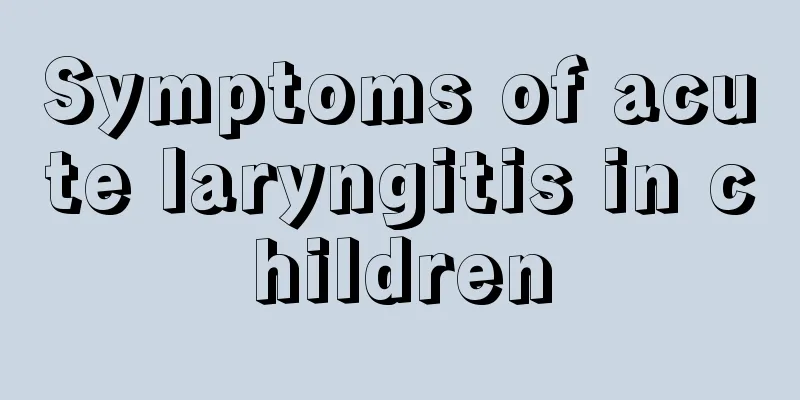Why do children sweat a lot?

|
Sweating is one of the ways of human metabolism and also a way for the human body to quickly lower its body temperature. People usually sweat a lot after strenuous exercise or when the weather is very hot to balance the body temperature. However, babies sometimes sweat a lot, which is a bit unreasonable. Therefore, many parents worry whether there is something wrong with their children's body. In fact, there are many reasons why children sweat a lot. If you want to know, let’s learn about it together. 1. Hot weather is one of the reasons why children sweat Sweating is a kind of nerve reflex in the body. Because children are in the stage of growth and development, their physiological metabolism is vigorous and the regulatory function of the nervous system is not very sound, so they sweat a lot, which is medically called physiological hyperhidrosis. Children with this kind of physiological hyperhidrosis will sweat more obviously in the following situations, such as in summer, when the child wears too many or too tight clothes, when the child is active, when eating hot food, or when the child is nervous or scared. If the child has no other abnormal symptoms, that is, it is physiological hyperhidrosis. Such children sweat a lot, not because of physical weakness. Parents do not need to worry and no special medication is needed. 2. Sometimes sweating is caused by certain diseases Children tend to sweat easily after falling asleep at night, often wetting their vests or bed sheets, and they are prone to getting sick when they catch a cold. This phenomenon is medically called "night sweats", which may be a manifestation of calcium deficiency in children and an early manifestation of rickets. Parents must pay attention to this problem. 3. It is a response of the brain to external stimuli: Infants and young children are in a rapid stage of growth and development. Their metabolism is more vigorous than that of adults, and they are always active. In addition, their skin contains more water and their capillaries are widely distributed. More importantly, their bodies have poor ability to adjust to cold and heat. Once they are stimulated or excited by the environment, more water is dissipated through the skin, especially in hot summer seasons, when the room temperature is too high, when wearing or covering too thickly, when eating hot food quickly, or after exercise. 4. The neural system is not fully developed: When some mothers see their babies sweating a lot, they will first worry that their babies have rickets. In fact, excessive sweating is not necessarily a unique manifestation of rickets. Because the nervous system function of infants and young children is not fully developed, the high excitability of the sympathetic nerves will cause hyperhidrosis. As long as the baby does not show other abnormalities, there is no need to think it is abnormal. This type of sweating is different from rickets in that it is mostly caused by excessive activity during the day and excessive sweating after falling asleep at night. It often occurs within half an hour after falling asleep and is mainly seen above the head and neck, especially the forehead. The quilt is not wet, but sweating may also occur on the chest and back. But as long as you enter deep sleep, sweating will gradually decrease. As the baby's nervous system gradually develops, this sweating phenomenon will improve. Abnormal reasons for excessive sweating in children: 1) Active rickets: Infants under one year old sweat a lot. If they lack outdoor activities and sun exposure, and do not add cod liver oil and calcium powder in time, parents should investigate whether the baby has other manifestations of rickets besides sweating, such as crying at night, crying and shaking head on the pillow while sleeping, causing hair loss rings on the back of the head (also known as occipital baldness), ping-pong head (the bone in the occipital bone becomes soft, and it feels like touching a ping-pong ball), square skull (the forehead is protruding and the head is shaped like a square box), and a large anterior fontanelle that closes late. Parents should take their baby to the hospital for examination by a doctor to get a clear diagnosis. (2) Children with active tuberculosis often sweat a lot not only in the first half of the night, but also in the second half of the night before dawn, which is called "night sweats." At the same time, there are poor appetite, low fever in the afternoon (some have high fever), flushed face, weight loss, and some have cough, enlarged liver and spleen, swollen lymph nodes and other symptoms. There is often a history of tuberculosis, and the elderly, parents or nannies in the family often suffer from tuberculosis. (3) Hypoglycemia often occurs in the hot summer when babies sweat a lot, refuse to eat at night, and feel listless when waking up in the morning. The children show symptoms of discomfort and restlessness, pale complexion, cold sweat, even profuse sweating, cold limbs, etc. (4) Pediatric endocrine diseases (this type of disease causing hyperhidrosis is relatively rare) such as hyperthyroidism, which is more common in school-age children, mostly girls. It may manifest as excessive sweating, irritability, increased appetite without weight gain, panic, heart palpitations, and even bulging eyes. Babies with obesity also sweat easily, and they sweat more when they move or walk. |
<<: How to judge whether the baby has bloating
>>: What to do if your child sweats profusely
Recommend
Why is the stool green in a full-month baby?
Mom and Dad take care of their babies meticulousl...
What are the symptoms of acute tonsillitis in children?
Acute tonsillitis is a very typical disease. It i...
What to eat for 5 month old baby
For parents, the most exciting thing is to witnes...
What are the symptoms of tonsillitis in children?
As parents, we should understand that children ar...
What are the treatments for influenza in children?
There are many types of colds. It takes about a w...
What to do if you have frequent night terrors
Night terrors are a very common disease in daily ...
Why do children urinate frequently?
It is not difficult to find in our daily life tha...
Why don’t children change their teeth when it’s time for them to do so?
When children reach a certain age, they will star...
How to treat hydrotesticular effusion in children
Under normal circumstances, there will be a small...
When caring for your baby’s private parts, pay attention to these details!
There are many things to pay attention to in the ...
Will babies be zinc deficient?
We often find that babies have poor appetite, sle...
What to do if children have a fever after eating too much
Nowadays, babies are the center of the family. Pa...
Tips to relieve baby's stuffy nose
When the baby's nose is blocked, it will be d...
Causes of hair loss in children
For children, everything is developing rapidly, s...
What should I do if my baby’s scrotum is small?
Many mothers have reported that when they found t...









